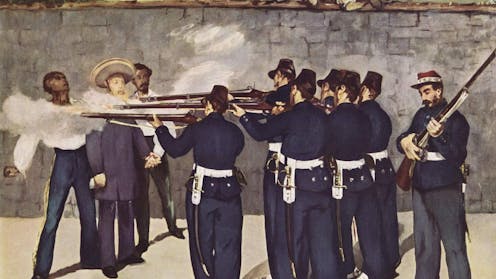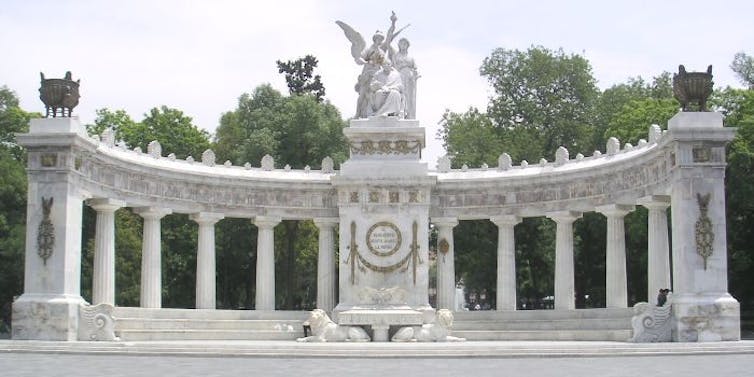
In 1867, the world’s most powerful statesmen, including Austria’s Emperor Franz Josef, France’s Napoleon III and US secretary of state, William H. Seward, petitioned the Mexican government to spare the life of a condemned man.
Mexico’s ragtag army and militias had just humbled France, then Europe’s preeminent land power. The costly six-year campaign drained the French treasury and eroded Napoleon III’s domestic support. Napoleon’s ambition to transform Mexico into a client empire under a Vienna-born, Habsburg archduke, crowned Maximilian I, ended in spectacular failure.
After his defeat, Maximilian was brought before a Mexican military tribunal. European monarchs regarded the prisoner as their peer, but Mexican liberals convicted him as a piratical invader, usurper and traitor. Despite indignant appeals from European courts, President Benito Juárez refused to commute his sentence. The would-be emperor was executed by firing squad.
Get your news from actual experts, straight to your inbox. Sign up to our daily newsletter to receive all The Conversation UK’s latest coverage of news and research, from politics and business to the arts and sciences.
The controversy went beyond one monarch’s fate. It crystallised a clash between opposed visions of global order — as Peru’s president Ramón Castilla said at the time, it was a “war of the crowns against liberty caps”.
Today, world politics are in flux. The so-called liberal international order, nominally grounded in multilateralism, open markets, human rights and the rule of law, is facing its gravest crisis since the second world war. Former advocates such as the United States now openly flout international law and undermine the very norms they once championed. China remains ambivalent, while Russia unabashedly hastens the order’s unravelling.
More broadly, the old post-second world war order appears out of step with the global south and with widespread anger over double standards exposed by the wars in Ukraine, Gaza and Iran. Amid today’s crises, a world order arranged for and by the great powers looks both insufficient and doomed to lack legitimacy. Reordering will require support from diverse actors, including states across the global south.
1860s: a turbulent decade
The 1860s were a turbulent, although often overlooked, moment of global reordering. Technological shifts – the telegraph, electricity, steamships and railways – appeared as disruptive then as AI does today. Combined with shifting power dynamics, these transformations accelerated imperial expansion. Yet the rules of the emerging order remained uncertain, even among the imperial powers themselves.
In Europe, networks of dynastic rule still carried weight in international politics. Under growing pressure, the ancien régime sought to reinvent and reassert itself. The old empires often justified their expansion by promising to bring order and progress to supposedly backward peoples. But that “civilising mission” clashed with a worldview emerging from Spanish America – where countries had thrown off colonial rule to establish independent republics.
As we wrote in a recent article in American Political Science Review, Spanish American diplomats articulated a republican vision of international order centred on the protection of weaker states from domination by great powers.
Fending off Europe’s empires
Divided by civil conflict, Mexico became an easy target for European empires. Mexico’s Liberal party had regained power but faced internal dissent and crippling foreign debt. Britain, France and Spain formed a coalition to invade and demand repayment. France, however, had more ambitious designs.
Exploiting the distraction of the US civil war, Napoleon III dreamed of transforming Mexico into a Latin stronghold against Yankee expansion. Best of all, Napoleon thought the scheme would turn a profit. A stable Mexican empire could repay the costs of the intervention – with interest – by increasing production from the country’s famed silver mines. Meanwhile, France would gain a receptive market for its exports and a grateful geopolitical subordinate.
Maximilian, a young Austrian prince of the house of Hapsburg, somewhat naively accepted the offer to rule a distant and unfamiliar land. He dreamed of regenerating Mexico through a liberal monarchy while reviving his family’s declining dynasty.
Led by Juárez, Mexico’s liberals fiercely resisted Maximilian’s rule. While militarily Juárez was consistently on the defensive, he remained diplomatically proactive. The Juaristas encouraged US sympathies that proved decisive after the end of the civil war. They also enjoyed solidarity – though limited material support – from other Spanish American republics. Although the monarchies of Europe all recognised Maximilian as Mexican emperor, Juárez’s defiance became a rallying point for liberals and republicans in Europe.

Vision of a new order
Beyond stoking sympathies, Juárez and his followers offered trenchant critiques of unequal international rules and practices cloaked in liberal guise.
First, the “republican internationalism” of Mexico’s Juaristas stood in direct opposition to European liberals’ “civilising mission”. Latin American republicans rejected the notion that progress could be imposed on their countries from abroad – though some echoed civilising rhetoric toward their own non-white populations, who like in the US were subject to campaigns of violence and dispossession that stretched from northern Mexico to the Patagonia. Many Latin American liberals likewise remained silent about empire elsewhere.
Second, the Juarista vision placed popular sovereignty, not dynastic ties, at the heart of legitimate statehood. These ideas drew on Mexico’s independence tradition and the principles enshrined in the 1857 constitution. European intervention, in this view, aimed to suppress popular rule in the Americas and extend the reaction against the failed revolutions of 1848, which had seriously threatened the old order when they raged across Europe.
Third, popular sovereign states were equal under international law, regardless of power, wealth, or internal disorder. Sovereign equality also underpinned Latin America’s strong commitment to non-intervention. Liberal writer and diplomat Francisco Zarco, a close confidante of Juárez, condemned frequent European economic justifications for intervention as the work of “smugglers and profiteers who wrap themselves in the flags of powerful nations”.
Finally, Mexican liberals called for an international system premised on republican fraternity, drawing on aspirations for cooperation that went back to liberator Simón Bolívar. The independence leader and committed republican convened a conference in 1826, hoping that a confederation of the newly independent Spanish American states would “be the shield of our new destiny”.
Similar arguments for an international order that advances non-domination still resonate in the global south today. The Mexican experience also underscores that the architects of international order have never come exclusively from the global north – and those who shape its future will not either.
Tom Long receives support from UK Arts and Humanities Research Council grant AH/V006622/1, Latin America and the peripheral origins of the 19th-century international order.
Carsten-Andreas Schulz receives support from UK Arts and Humanities Research Council grant AH/V006622/1, Latin America and the peripheral origins of the 19th-century international order.
This article was originally published on The Conversation. Read the original article.







